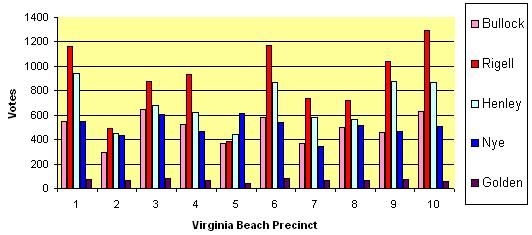
Frame it any way you want: Black at the Beach is a tough political road. Tanya Bullock self-identifies as Republican. Though there are city council “districts,” every voter votes in every race. Meanwhile, local political leadership demonstrates prejudice and tolerates the prejudiced. Tanya Bullock failed election during Rigell’s overwhelming win.
- What does Tanya Bullock’s performance at the polls tell us?
- Does the insensitive leadership of the RPVB manifest the social outlook of the Virginia Beach electorate?
- Is that general social outlook reflected in an electoral system that makes it virtually impossible for a black candidate to prevail in local races?
Tanya Bullock is a Virginia Beach attorney. She was endorsed by Governor Bob McDonnell, a fellow Regent University Law School alumnus. She happens to be black. After last week, she might be wondering who her constituency is.
Republicans are not good at math (see the McDonnell ABC disaster), so this might wear on them a bit. That’s why a picture is worth a thousand words and millions of calculations. This graph is not cherry-picked. It is representative: the first 10 of 95 precincts. The remainder of the data follows below the fold. At first glance what you see appears to say that Tanya doesn’t know who her constituency is. Barbara Henley was the Democrats’ candidate. Councilwoman Henley is white. Apparently a lot of Republicans (and Modern Whigs) preferred her for some reason.
There is a reality in local races, particularly situations like this where a politically charged Congressional race is the main attraction, that the local races suffer a significant under-vote; voters just lose interest in the down-ballot races. In Virginia Beach, where every city council and school board seat is contested across the entire city, the eyes get bleary; and mistaken voters often only vote in their own districts or just for whom they’ve heard. Eliminate that factor explaining Tanya’s delta from Rigell. The under-vote for this particular seat was just at 17%. If Tanya had had just that drop-off from Rigell’s vote, she would have garnered 53,362 votes. But she had 44,975; a drop of 19,163 votes from her Republican “running mate.” And actually, Ms Henley had what should have been the corresponding Rigell under-vote with 53,599.
Interesting. So, while Tanya pulled 92.4% of Nye’s vote total, Barbara drew 83.6% of Rigell’s. But in what may be an even more telling count, the absentee voting, the results are even more distressing. Absentee voters are substantially more motivated voters; often having been directly contacted by the political parties. Bullock did not even total 50% of Rigell’s count while the under-vote was some 25%. And if you include the Modern Whig Party candidate’s total with Rigell’s (those voters certainly aren’t Democrats), Bullock draws only a 46% interest. Meanwhile, Henley had 80% of Rigell’s count and 126% of Nye’s. Bullock had 76% of Nye’s vote; almost the exact under-vote percentage. So, you see a correlation without a lot of straining.
Republicans like to wonder aloud why blacks fall in with the likes of the Democratic Party. They love to point to the segregationist members of the 1960s. Of course, they won’t mention that those unrepentant bigots defected to the Republican Party in the 1970s. In the end, what they won’t admit is that the attraction actually has a lot less to do with skin color and a lot more to do with economic status. But Republicans don’t want to let loose that argument.
- The Republican constituency cannot be counted upon to support just any candidate espousing party loyalty and principles; other factors mitigate
- There is no pleasant spin for Bullock’s drubbing; the stories about the E-mails circulated by past (and at the time, current) RPVB chairs are evidence that, even putting it in the best light, the leadership is deaf and dumb
- It is impossible to see into the souls of those who put and keep the current electoral system in place. But there is no denying that it makes the likelihood that a black will be elected in Virginia Beach rather slim. Todd Davidson was elected to the school board last week. Okay, 1 of 13 elected. This is such that black Democrats even wonder if their own party’s support is sincere. Oh, it is, but until the method of electing local representation is challenged, the battle is almost futile. What you must wonder is why the local NAACP has never effectively challenged this status quo.
And despite all the big tent bull the elephants want to pass around, Ms Bullock throwing in with the RPVB is comparable to a goyem, based upon the stylish suits, declaring he or she is Hassidic and thinking that on the merits of that declaration alone, will be accepted with open arms. She did not attend last Saturday’s RPVB breakfast which featured a talk by the Virginia Attorney General. At kick-off, there were two visible minorities among attendees in the room. Cooch really draws a diverse crowd. Karen Beauchamp (see comments) was there at the table beside Congressman-elect Rigell’s and was honored by the current committee chair.
There are local Republicans who I am certain sincerely want and appreciate a big tent. Delegate Sal Iaquinto (R-84th) stands on solid ground. However, his outreach efforts are doomed to falter until there is a sea change of awareness locally. Want a key to success? Lead the charge to a more equitable electoral process in Virginia Beach. But before that, however, change whatever it is that causes Republican voters to abandon black Republican candidates. Because whatever that reason may be, I can make this suggestion in public boldly and without worry that Republicans might steal away the minority vote. The Democratic Party simply embodies and represents more shared values and interests.
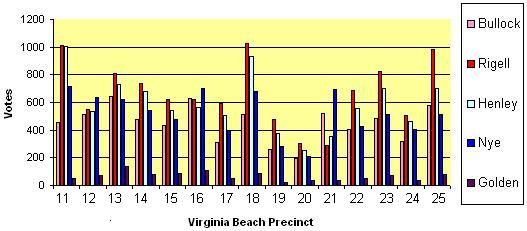
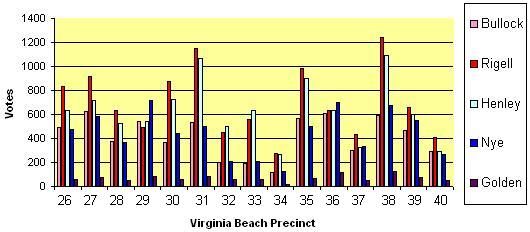
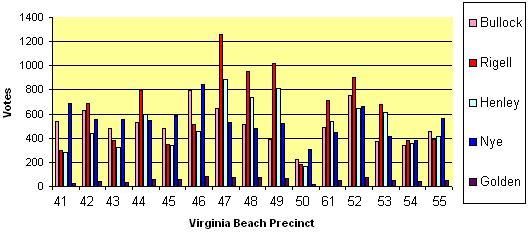
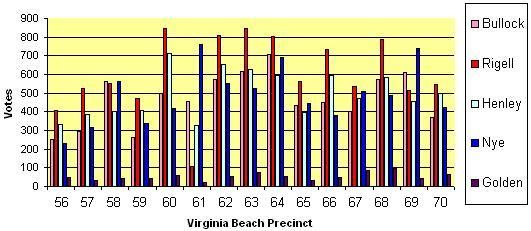
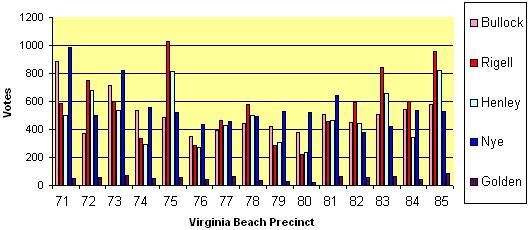
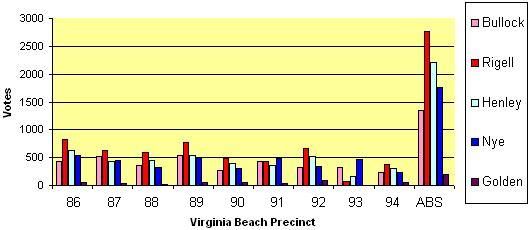

![[UPDATED with Official Announcement] Audio: VA Del. Dan Helmer Says He’s Running for Congress in the Newly Drawn VA07, Has “the endorsement of 40 [House of Delegates] colleagues”](https://bluevirginia.us/wp-content/uploads/2026/02/helmermontage.jpg)
















